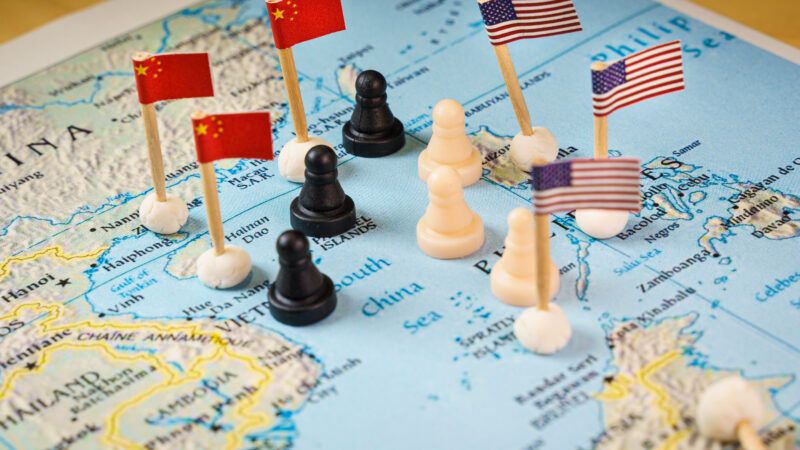Congressional Commission's Taiwan Plan Is a Mixed Bag for U.S. Interests
The bipartisan plan encourages greater involvement by the U.S. military than past policy.

The U.S. government's "strategic ambiguity" over whether it will defend Taiwan against a Chinese invasion got a little less cloudy last week when the bipartisan House Select Committee on the Strategic Competition between the United States and the Chinese Communist Party published Ten for Taiwan, a list of observations, concerns, and recommendations regarding a potential assault of Taiwan by Mainland China.
"Taiwan is a cornerstone of the global economy and a vital partner of the United States," the report opens. "It is in the political, security, and economic interests of the United States to deter an act of military aggression from the [People's Republic of China] toward Taiwan." But how much deterrence can the U.S. provide without compromising its own interests—namely, avoiding war with the second-most powerful country on Earth?
The committee's report is part capabilities assessment, part call to action. Its recommendations to Congress and the U.S. government are numerous: increase the number of "long-range strike assets" in the Asia-Pacific region; combine military training with Taiwan; provide Taiwan with the military equipment and weapons it has already purchased; establish a standing Joint Task Force; enhance the "cyber resiliency" of U.S. infrastructure; strengthen Taiwan's cybersecurity; create a combined planning group for the U.S. and Taiwan; strengthen U.S. bases in the region; and expand Taiwan's military stockpiles.
"You could regard these policies as the next step in fulfilling what the committee believes to be our obligations under the Taiwan Relations Act," says William Galston, a senior fellow at the Brookings Institute. The Taiwan Relations Act states that "the United States shall make available to Taiwan such defense articles and defense services in such quantity as may be necessary to enable Taiwan to maintain a sufficient self-defense capability."
Galston notes that Biden "has replaced the U.S. policy of deliberate ambiguity concerning our response to a Chinese attack with a much more full-throated promise to come to the aid, including military aid, of Taiwan."
In May 2022, Biden responded affirmatively to a question about whether the U.S. would defend Taiwan militarily during a joint press conference with Japanese Prime Minister Fumio Kishida. The White House denied that Biden's statement deviated from the U.S. government's historical position, and Biden reasserted this position in a September 2022 interview, clarifying that the defense would include U.S. forces.
Acquiring weapons is part of the island country's "porcupine strategy," which uses a stockpile of anti-air, anti-ship, and anti-tank weapons to "prick" Chinese invaders. As Galston explains, "You're not going to beat a Chinese invasion with F-16s. But if you really focus on the most effective defensive tactics, then that will shape the kinds of missiles that would also be emphasized in shipments to Taiwan."
The provision of self-defense weapons to Taiwan is the correct approach, Doug Bandow of the Cato Institute argued in a piece for the American Institute for Economic Research. This strategy supports Taiwan by deterring a Chinese invasion while also allowing the U.S. to avoid getting pulled into a costly war with China. "Today the US and democratic states should be making conflict less likely by arming Taiwan, insisting that it take its own defense seriously," Bandow wrote. "That should highlight the urgency of selling Taipei arms today."
Bandow also encourages the U.S. and its allies to coordinate an economic, not military, response to a Chinese invasion. "Washington also should organize allies and friends in Asia and Europe to prepare a set of economic sanctions to impose on China if the latter attacks the island, and to communicate that intention to the [People's Republic of China] now," Bandow wrote.
Taiwan is a free and democratic state. America can celebrate and bolster that status with free trade, diplomatic recognition, and weapons loans, but committing forces to a deadly conflict with Mainland China is not in America's best interest.


Show Comments (8)